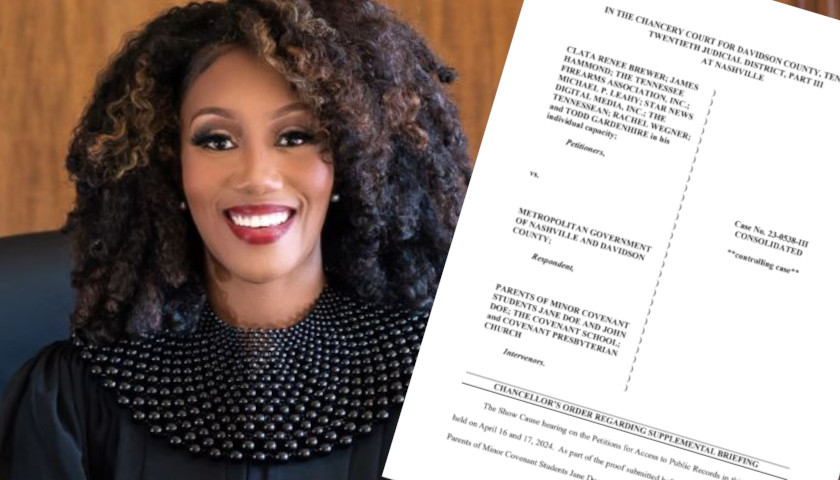Live from Music Row Tuesday morning on The Tennessee Star Report with Michael Patrick Leahy – broadcast on Nashville’s Talk Radio 98.3 and 1510 WLAC weekdays from 5:00 a.m. to 8:00 a.m. – host Leahy welcomed Tennessee State Senator (R-TN-08) Frank Niceley in-studio to outline SB2616, which would require three years of state residency to run for the U.S. House of Representatives, and the importance of state sovereignty.
Leahy: In-studio, our good friend, State Senator Frank Niceley, Republican from Strawberry Plains. Senator Niceley, you have introduced a bill that establishes residency requirements in the state of Tennessee to get on the primary ballot to run for the U.S. House of Representatives. What’s the bill number and what is the status of that bill?
Niceley: It’s Senate Bill 2616. It will be in the State and Local Committee today. As you said, it establishes residency. I’ll give you just a little bit of history. A lot of us didn’t really know what the residence requirements were for being a politician in the state, but our state Constitution requires that you live here seven years before you can run for governor.
You have to live here five years before you can run for judge or a DA, and three years to run for the state Senate or the state House. We got to look in it, and there are no residence requirements to run for either U.S. Senator or congressman.
Leahy: Yes. There’s no length of residency. The Constitution simply says you have to be an inhabitant of that state.
Niceley: Right. The U.S. Constitution allows us to put a residency on our electors for the Electoral College, and we don’t have to, but we can, up to the maximum of whatever our state House is, which is three years.
Leahy: And in this case here, Tennessee, we have 11 electors. When you go to vote for president, you’re voting for the electors. The electors are certified and they send it to Congress. And in a joint session, they either accept or reject those electors.
Niceley: Right. And those electors have a residency requirement. They have to live in Tennessee for three years before they can be an elector.
Leahy: I didn’t know that.
Niceley: The U.S. Constitution says our residence requirement may be as much as the House Representatives in the state, which is three years. We don’t have to have one, but we do, for three years.
We got to looking and there’s no residency on the U.S. Senate or Congress. So we thought we knew what went on there. And we thought just to make it fairly easy, not make it like the governor, we’ll just make it the same as a state Senate or state House.
Leahy: Sounds reasonable to me.
Niceley: It does, but that’s when the trouble starts. (Leahy laughs) There’s always someone who says, “well, that’s unconstitutional,” but it’s clearly constitutional. There’s a thing called the 10th Amendment. That’s my favorite amendment, I guess.
Leahy: And by the way, the cheering you hear is our audience, because we are big proponents of the 10th Amendment. We think the system of federalism works well and best when the states assert their sovereignty in the areas where the Constitution provides that sovereignty.
Niceley: I guess my favorite amendment is the one that repealed prohibition. (Leahy laughs) But my second-favorite amendment is the 10th Amendment. And it’s clear, and it’s more powerful than a clause. It’s a full-blown amendment. If it’s not mentioned in the Constitution, it’s left up to the states.
Leahy: Ratified by the appropriate number of states on December 15, 1791, the last of the 10 amendments included in the Bill of Rights.
Niceley: Let me tell you what Scalia said about this term-limits thing in the Constitution: “Nothing in the Constitution deprives the people of each state of the power to prescribe eligibility requirements for the candidates who seek to represent them in Congress.
The Constitution is simply silent on this question. And where the Constitution is silent, it raises no bar to action by the people in other states.”
Leahy: That’s Justice Antonin Scalia, the late, great Scalia. The best. I mean, we’ve heard the term originalist described sometimes. He preferred the term textualist because he went to the text of the Constitution.
That part where you say nothing in the Constitution prohibits states from establishing eligibility requirements to run for the House of Representatives is very powerful, I think.
Niceley: It is powerful. I mean, who could say it any better than Scalia? Thomas is pretty good himself. He’s written on this thing. He agrees with Scalia and O’Connor and several of all the Conservatives agree that we can put limits on.
Leahy: And what you just read was from the 1995 dissent in a case which was written by Thomas, concurred in by Scalia, Rehnquist, and Sandra Day O’Connor. It was five-four – a very close case where the Supreme Court ruled that the state of Arkansas could not put term limits on folks running for Congress. That precedent, however, if it were to be tested in today’s court, would probably be five-four the other way, it seems to me.
Niceley: Could very well be.
Leahy: Could very well be. Tell us the details of your bill, SB 2616. Exactly what does it do?
Niceley: If you put it up on the computer it will say that you have to vote in the last three general elections. But we’ve decided that rather than do that, we just go, we’re going to have an amendment that completely rewrites the bill and says before you can run a primary in Tennessee, that you have to have lived here three years.
Leahy: And that’s interesting because you say before you can run in a primary, not before the primary election. If that’s the case, that would mean this would have to be before the petitions are filed. Three years residency.
Niceley: Same as me. I have to live here for three years. The state representatives have to live here for three years. It’s reasonable. It’s constitutional.
Now, there’s always someone who – that’s what lawyers get paid for is to argue about things. But it’s hard to argue with Scalia and Thomas.
Leahy: Hard to argue with Scalia and Thomas in Tennessee, that’s for sure.
Niceley: It really is.
Leahy: I’m sensing that in the Tennessee General Assembly, there’s widespread support for this bill.
Niceley: There is. So far, everyone seems to like it but I’ve been here long enough to know that when the other side puts the pressure on, a few people will fold so you have to have a few extra votes.
Call it liars insurance when you can’t vote – if you need five, you better get seven. You have to have the liars insurance. (Leahy laughs) But I feel good about it. It’s so reasonable and simple.
Leahy: Yes, it seems pretty straightforward. And so this is before the state and local committee.
Niceley: It is.
Leahy: Of the state Senate today. And then if it makes progress in the state Senate, which looks like it will, then the state House would undertake it.
Niceley: Right.
Leahy: The House of Representatives. Did you say you served in the state House of Representatives?
Niceley: 12 years.
Leahy: 12 years in the state House of Representatives, and now you’ve served in the state Senate for 10 years.
Niceley: Ten years.
Leahy: What’s the difference between serving in the state House of Representatives and serving in the state Senate?
Niceley: I tell people when you’re elected to the House, it’s kind of like going back to high school. (Leahy chuckles) When you get elected to the Senate, it’s kind of like going to a nursing home.
Leahy: (Laughs) Now that’s funny.
Niceley: (Chuckles) It’s funny because there’s truth in it. Good humor has to have a little truth.
Leahy: It’s interesting, because as I go on the floor of the Tennessee House of Representatives, the 99 members of the House, only 33 members of the state Senate, the chambers have a very different feel to them.
Niceley: They do. The Senate tends to calm people down and the House tends to rile them up a little bit. But I’d have to say the House is more fun. (Laughter)
It pays the same and the House is more fun. You just have to run every two years instead of four. But the Senate is a good place for old people.
Leahy: (Laughs) Our friend state Senator Kerry Roberts now is probably going to call us and say, “I’m not that old yet!”
Niceley: He’s getting there.
Leahy: Yes. I noticed that. And I find it fascinating. And, of course, this is one of the reasons why we love having members of the Tennessee General Assembly here.
If you look at the Constitution as we’ve talked about, so many powers reside in the state legislature, and yet it seems sometimes the state legislatures are perhaps a little reticent to exercise those powers.
Niceley: It is, and I think two things happen. The struggle is all since the times of Hamilton and Jefferson; the struggle between whether we are actually a Republic made up of sovereign states or whether we are just one big nation made up and ruled out of Washington.
And the struggle goes on. That’s one consistent struggle from the beginning until today. Sovereign. You teach your grandkids what sovereign means. It’s all-powerful. We’ve delegated a few powers to the federal government.
And their fear, if you go back and read the original, they were afraid that the central government would steal their powers, and they’re trying to. But evidently, a Republic is a stubborn thing and we still hold it on to a lot of our states’ rights.
Leahy: Exactly. And that’s one of the reasons why I always love having members of the Tennessee General Assembly in here to talk about that process I think is so critical to the continuation of our constitutional Republic, that state legislatures exert their sovereignty whenever and however they can. And so I salute you and your other members.
Niceley: Two things that I think weakened our Republic and, of course, that was the war between the States and the Great Depression.
Leahy: Exactly. Now in 2022, I see great signs of state legislatures reasserting their sovereignty, and I salute you and all the other members of the Tennessee General Assembly for leading that charge.
Niceley: Thank you. We try to preserve the Republic. They say Lincoln saved the Union but he was really hard on the Republic.
Leahy: (Laughs) That is a great line! And on that note, we’ll say thank you for joining us in-studio, state Senator Frank Niceley.
Niceley: Thank you.
– – –
Tune in weekdays from 5:00 – 8:00 a.m. to The Tennessee Star Report with Michael Patrick Leahy on Talk Radio 98.3 FM WLAC 1510. Listen online at iHeart Radio.
Editor’s note: Justice Clarence Thomas wrote the dissenting opinion in U.S. Term Limits v. Thornton (1995), on behalf of all four dissenting justices, which included Justice Antonin Scalia, Justice William Rehnquist, and Justice Sandra Day O’Connor.








